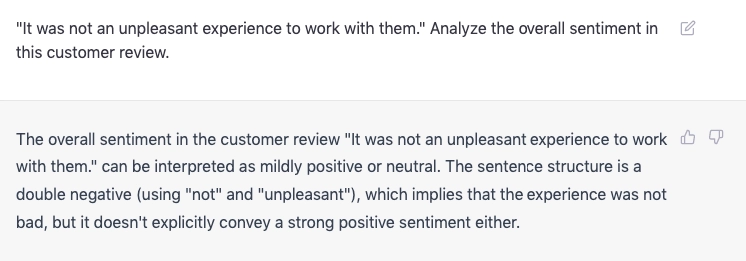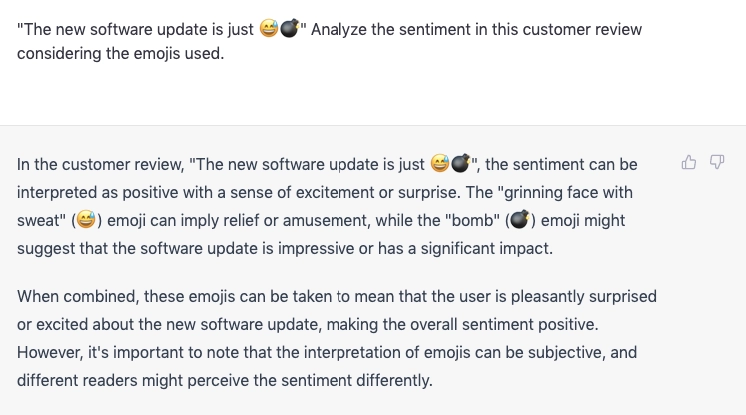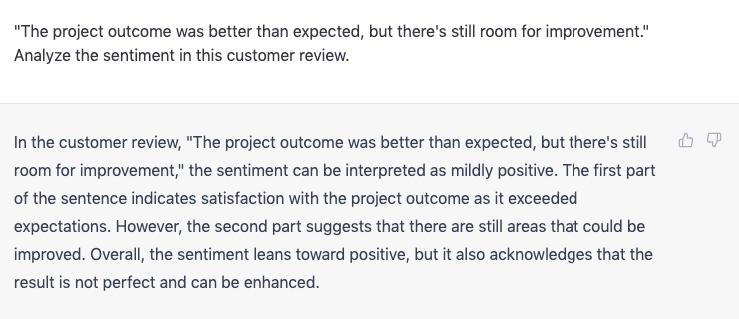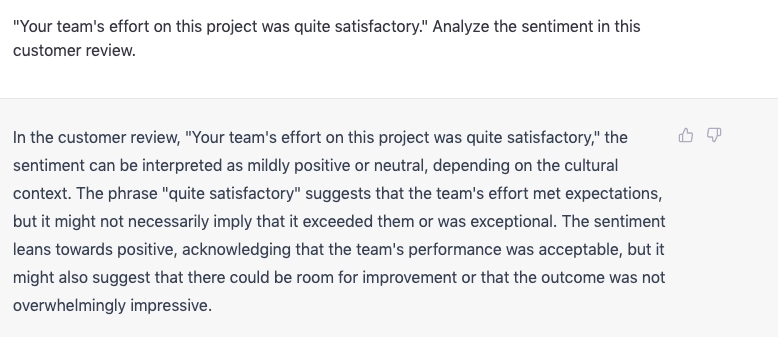A study estimated that 80% of companies will adapt to solutions that utilize sentiment analysis in 2023. Sentiment analysis is a Natural Language Processing (NLP) method that classifies texts, images, or videos based on the emotional tone as negative, positive, or neutral. This classification provides insights into customer thoughts and feelings and helps companies develop strategies to improve their services or products.
With the advancement of generative AI models such as ChatGPT, companies can automatically handle natural language processing tasks and perform sentiment analysis without manually analyzing text data.
See the top 7 use cases of using ChatGPT while performing sentiment analysis on customer feedback and real-life examples:
Top 7 uses cases of ChatGPT in performing sentiment analysis
1- Preprocessing data
ChatGPT can help clean and preprocess unstructured data by removing irrelevant information (e.g., special characters, hashtags), correcting typographical errors, and standardizing the format of data coming from multiple sources. This ensures data consistency and improves data quality for subsequent sentiment analysis.
Example:
- Original Text: “Ths proDuct is amazng!! Best evr. #loveit”
- Preprocessed Text: “This product is amazing! Best ever. love it.”
2- Feature extraction
ChatGPT can extract relevant features from text data, such as industry-specific keywords, technical terms, and domain-specific phrases that can impact sentiment. By extracting these features, a sentiment analysis system can better understand and interpret the unique nuances in customers’ communication with brands.
Example:
- Text: “Their API integration was seamless, and the documentation was thorough and clear.”
- Extracted Features: [“API integration,” “seamless,” “documentation,” “thorough,” “clear”]
3- Context understanding
ChatGPT can analyze the data context, considering domain-specific knowledge, industry jargon, and the unique relationships between businesses and customers. This allows it to differentiate between positive, negative, and neutral sentiments effectively.
Example:
- Text: “The onboarding process for their software was efficient and saved us a lot of time.”
- Context: A user is discussing a positive aspect of a B2B software onboarding process.
- Overall sentiment: Positive
4- Training data generation
ChatGPT can generate synthetic text data with various sentiment labels, which can be used to augment existing training datasets or create new ones. This can help improve the performance of sentiment analysis models.
Example:
- Generated text 1: “The customer support team for the software was proactive and helped us resolve issues quickly.”
- Label: Positive
- Generated text 2: “The lead generation tool didn’t deliver the promised results and was difficult to use.”
- Label: Negative
5- Sentiment classification
By fine-tuning ChatGPT on sentiment analysis tasks, it can be used as a classifier, directly predicting a given text’s sentiment.
Example:
- Input: “The project management tool has significantly streamlined our processes, and the team collaboration features are fantastic.”
- ChatGPT sentiment prediction: Positive
6- Multi-language support
ChatGPT has a wide range of language understanding, which enables it to be used for sentiment analysis tasks across different languages. This allows companies to reach broader markets and regions.
Example:
- Text (French): “Leur service d’assistance technique est très réactif et compétent.”
- Translation: “Their technical support service is very responsive and competent.”
- Overall sentiment: Positive
7- Real-time analysis
ChatGPT can be deployed in real-time applications like social media monitoring, customer service, or competitor communication analysis to provide immediate sentiment analysis and help businesses make data-driven decisions.
Example:
- Scenario: Monitoring a company’s LinkedIn account for client feedback. Comment: “@company We are not satisfied with the recent changes in the pricing model. It’s affecting our budget.”
- ChatGPT sentiment analysis: Negative
- Action to be taken: The account management team can discuss their concerns with the client.
Challenges of using ChatGPT in sentiment analysis
Indeed, there are challenges when using ChatGPT for sentiment analysis, particularly due to its reliance on the training data and potential biases. Here are some real-life examples that illustrate these challenges: Indeed, there are challenges when using ChatGPT for sentiment analysis, particularly due to its reliance on the training data and potential biases. Here are some real-life examples that illustrate these challenges:
Negation detection
It is an important challenge in sentiment analysis, including when using ChatGPT. Negation can alter the meaning of a sentence and, in turn, the sentiment. The presence of negation words, such as “not,” “never,” or “without,” can reverse the polarity of sentiment, which makes it harder for the generative AI model to extract the sentiment (See Figure 1).
Figure 1. ChatGPT sentiment analysis on a customer review, including negation terms.

Use of emojis
Emojis can provide valuable information about the sentiment of a message. For example, a positive sentiment may be associated with emojis like 🙂, 😄, or ❤️, while a negative sentiment may be related to emojis like 😞, 😠, or 💔. ChatGPT can recognize and process emojis to some extent, as it has been trained on a diverse range of text data. However, the understanding and interpretation of emojis may not be as robust as of text, especially regarding more complex or nuanced emojis (See Figure 2).
Figure 2. ChatGPT sentiment analysis on a customer review including emojis.

Ambiguity
It can arise from several factors, including polysemy (words with multiple meanings), idiomatic expressions, or unclear context. The presence of ambiguous language can make it difficult for models like ChatGPT to determine the sentiment of a given text accurately (See Figure 3).
Figure 3. ChatGPT sentiment analysis on a customer review which is ambiguous.

Cultural nuances
In some cultures, people might express their sentiments more directly, while in others, they might use more indirect, subtle, or polite language. These variations can make it challenging for ChatGPT to identify and classify sentiments accurately (See Figure 4).
Figure 4. ChatGPT sentiment analysis on a customer review is ambiguous and may be interpreted differently depending on cultural differences.

Also, check our data-driven list of sentiment analysis services to determine which option satisfies your company’s needs.
Further Reading
- Sentiment Analysis Tools
- Top 3 MonkeyLearn Alternatives for Sentiment Analysis
- Top 8 Sentiment Analysis Datasets
- Sentiment Analysis Services Benchmarking
Please contact us if you have any additional questions about sentiment analysis:


![Top 4 Methods of Sentiment Analysis in Retail Industry ['25]](https://research.aimultiple.com/wp-content/uploads/2022/08/Methods-of-Sentiment-Analysis-IN-Retail-Industry-1-190x107.png.webp)
Comments
Your email address will not be published. All fields are required.